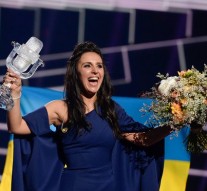
Ukraine wins Eurovision 2016 Amid Russia’s Criticism
External Relations 14 May 2016Eurovision 2016, which took place in Stockholm, Sweden, was won by Susana Jamaladinova, alias Jamala, with her song “1944,” evoking the deportation of Crimean Tatars in May 1944. Russia claimed the song as a criticism of its annexation of Crimea in 2014.
Ukrainian with Crimean Tatar descent, Jamala won Eurovision 2016 by singing about the deportation endured by her ancestors from Crimea to Central Asia under the Soviet Union, which accused them of collaboration with Nazi Germany during World War II.
Although it refrains from mentioning the illegal and continuing 2014 occupation of Crimea, the song has raised objections from Russian officials, who claim it is a finely veiled attack on the Kremlin.
“[If I win,] it will mean that modern European people are not indifferent, and are ready to hear about the pain of other people and are ready to sympathise,” Jamala was reported as saying by the Guardian from the Swedish capital shortly before the final.
Jamala is not the first controversial performer in the history of the contest. Even though Eurovision songs are expected to steer clear of politics and religion, some scandalous lyrics or controversial acts do slip through.
In 2009, Georgia’s entry “We Don’t Wanna Put In” was deemed unsuitable because of its obvious play on the Russian president’s name. It was offered Georgia to amend the lyrics, but eventually it chose not to participate in the contest.
Conchita Wurst, the bearded lady who won for Austria in 2014, was defined by Moscow as the “terminal decadence of the West.”
Boogie sang an anti-war song for Hungary last year, but the Israelis protested against a reference to Gaza being included in the song.
Another controversy sparked during this year’s qualifying round on Tuesday, when Iveta Mukuchyan from Armenia waved the flag of the disputed region of Nagorno-Karabakh. Officially part of Azerbaijan, the separatist region is currently under the control of the local ethnic Armenian forces.
For more information on the current situation in Nagorno-Karabakh, read “Pope Francis About to Visit South Caucasus Afflicted by War” and “Nagorno-Karabakh: a Resolution Is Completely Off the Radar!“
The Deportation of Crimean Tatars
Crimean Tatars have been living in the Crimean Peninsula since the 13th-17th centuries. After a period of political independence, Russia annexed Crimea in 1783 and began to repeatedly expel Tatars. As a result, Crimean Tatars, which constituted the majority of Crimea’s population until mid-19th century, are approximately 12% of today’s residents.
The last and worst expulsion occurred in May 1944, immediately after the liberation of Crimea. On the orders of Joseph Stalin, the whole Crimean Tatar population – including the families of Crimean Tatars serving in the Soviet Army –was exiled in trains and boxcars to Central Asia, mainly to Uzbekistan. According to some experts, tens of thousands died either during the deportation or as a result directly afterward.
Some were allowed to return to Crimea from 1967, while in 1989 the USSR Parliament condemned the deportation of Crimean Tatars.
Thank you, Europe – welcome to Ukraine!
Since the Russian occupation of Crimea in 2014 – mostly opposed by the Crimean Tatars – human rights groups have denounced a dramatic deterioration of their situation.
Last month, the Mejlis, the largest Crimean Tatar representative body, was labeled as an “extremist organization” and outlawed by a Russian court. Its approximately 2,500 members are now under threat of arrest.
Enraged at Russia’s annexation of Crimea and the Kremlin’s support of anti-Kiev insurgents in eastern Ukraine, many of her Ukrainian fans regard her victory as dealing a musical blow to Russia.
Read “Ukraine in Turmoil while Conflict Escalates in Eastern Region” and “Dutch People’s Fears Defeat Peace and Stability for Ukraine” for more information on the current situation in Ukraine.
“Of course it’s about 2014 as well,” said the Kyrgyzstan-born singer while referring to her song’s lyrics,“these two years have added so much sadness to my life. Imagine – you’re a creative person, a singer, but you can’t go home for two years. You see your grandfather on Skype, who is 90 years old and ill, but you can’t visit him. What am I supposed to do: just sing nice songs and forget about it? Of course I can’t do that.”
“I know that you sing a song about peace and love, but actually, I really want peace and love to everyone,” she said during the conclusive cerimony, as reported by the Guardian. Then, once received the the glass microphone prize, Jamala thrust it and yelled: “Thank you, Europe – welcome to Ukraine!”



